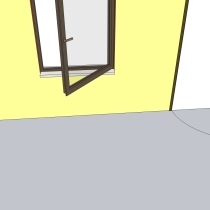Meditation helps teach you how to focus on a single point, for example, on your breath. By focusing on your breath, you are better able to calm your mind, which can mean less stress and anxiety.
This is because you will be focusing less on the things that cause you the stress and anxiety, and more on the things that you want, for example, the positive things in life.
For most people, this is a difficult task, since their brains are usually on autopilot, which means that their mind can focus on what ever it wants, and they have no say in it. They can try to redirect their focus, but in the end, their mind decides what to actually focus on. This is an example of how most peoples brains work, and how their mind is untrained.
Meditation teaches you to focus on certain things, such as your breath, a sensation, a sound, or other things such as objects. By creating a habit out of this and really sticking to a meditation practice, you will be taking the power from your brain, and will be better able to choose what you want to focus on, and to actually focus on it in a much easier way, without your mind going off on its own.
That is a significant way in which meditation helps with stress. People tend to feel stress about things that may happen in the future, and by overthinking these things and focusing on them, people feel even more stress. If we are able to stop this and even prevent it, much of our stress can be reduced.
Meditation apps can be very effective, especially for beginners. This is because meditation apps usually have a large amount of guided meditations, which are a great way for beginners to get into the habit of meditating, but also for more experienced meditators.
Many of them also have meditation timers that you can customize to your preferences, and other options such as meditation sessions with different background sounds that you can choose from.
Many of the meditation apps are also community based, meaning, there is a community that uses the app, and in that community you can read other people's experiences, questions, answers, and share your own.
A big reason why meditation apps are so effective is because beginners who are just getting into the practice of meditation tend to overdo it. Instead of slowly getting into it by starting with short sessions, they start with long sessions which they get very bored with, and eventually stop meditating.
Meditation apps usually have courses, and structured practices made for beginners, for example, the first few sessions will be 5 minutes, and as you progress, the sessions become longer and explore other types of meditations.
Having a structure, especially when starting out, can make a huge difference in the effectiveness of the meditation practice. And this is where meditation apps excel.
Meditation can help reduce stress by reducing your focus on the things that causes the stress.
By meditating, you learn how to focus your mind on a single thing, this could be an object, a sound, or a sensation. With time, you will be able to better focus on the things you want, and less on the things you do not, such as unwanted thoughts that cause stress and anxiety.
The use of objects can be a great way to practice mindfulness and to actually stay more mindful. There are a few ways you can utilize objects to help you stay more mindful.
Trying to constantly think about an object, and to focus on that object rather than on the thoughts that pop up into your mind, is a great mental challenge and a great mindfulness exercise.
By doing this, you are training your mind to stay focused on a single point, on a single thought, and to let the other thoughts pass by. You are training your control over your mind, and you are training your ability to control the thoughts your mind focuses on.
Another way to use objects to be more mindful is to simply look at an object, and to try and pay attention to it and to notice all of its details. To really sit and look at the object and to try and see all of the small little details that make up the object. You can focus on the shape, the texture, lines, curves, anything that you can notice on the object.
These two exercises may sound very simple, but, actually doing them can prove to be very tricky and difficult. Our minds are experts on getting what they want, which very often is to distract you. For the majority of most people's lives, their minds have been in control, their minds were what decided what to think of and what to focus on. Training to take this power away from your mind and trying to control it is not an easy task.
These two exercises allow you to work on taking back this power and choosing what your mind will focus on, rather than it choosing for you. This can help you to stop thinking about negative and unwanted thoughts, and can help you better stay positive by thinking positive thoughts, and thinking about and focusing on the things that you want.
Nothing can replace professional help. Even when it comes to journaling, they can have great exercises, tips, and ways of helping you reduce your anxiety, so that will always be my top advice. So if you can, I would suggest speaking to someone with authority, which I do not have, I only have my own personal experience to share.
Here I will write just what has helped me in the past overcome some of my anxiety, hoping this can help you too.
Writing about your anxiety may not always be an easy task, but if it is something that you are willing to try, it can actually have great positive effects.
If you are not sure where to begin when writing about your anxiety, try first take a few moments to write about what you are currently feeling, and what is currently going on in your mind.
This is just to get you into the mindset of writing, to allow your mind to ease up a little bit before getting into the heavier stuff.
After that, start writing down the feelings you have that you call anxiety. Try to write what it causes you to actually feel, and try to start identifying the cause or origin of these feelings.
Now, try to actually think about the matter that is causing you anxiety. Write it down however it comes to you. Don't try to write it from the beginning, or from the end, just write what comes to your mind, and from there, start exploring.
Try to explore why you feel anxiety about what ever it is that is causing it. If you don't know what is causing it, that is fine, just write down what you think it is. Explore different thoughts about it, where it came from, what you fear could happen, and what ever else comes to your mind.
It is important though to not linger on the anxiety and to not keep writing the same things down. This could cause you to just stay in the cycle of continually thinking about negative things that are causing the anxiety. Try to write things down with the intention of letting them go and moving on. Allowing the negative thoughts, worries, and fears to pass. Don't try and fight them either, just let them come in to your mind, and out on to the paper.
Again, I am not a professional, this is just what I have done in the past to help me overcome anxiety.
Journaling is definitely not a waste of time. Especially if you are suffering from stress or anxiety.
Journaling may feel quite strange to do in the beginning, but all it really is, is you just writing down your thoughts. These could be thoughts on events of the past day, thoughts of the future, past, or present, feelings, or just your thoughts at that moment.
The reason it is not a waste of time is because it helps calm your mind down. It helps release negative emotions. Journaling can help reduce stress and anxiety by allowing you to process the things that are causing them. By processing them, and better understanding them and the cause of them, you are better able to get through them and let them go.
Journaling can be a very freeing exercise, as it allows you to express what is in your mind, letting it all out, while better understanding it.
Journaling allows you to slow your mind down and to better understand the thoughts that you are writing down. This can help deal with events that have occurred throughout your day, and can help reduce stress that could have built up from those events.
Many people have trouble falling asleep and getting a good night's sleep due to too much stress. It prevents them from sleeping by keeping their minds racing through thoughts and through the events that may have caused the stress. Even when they fall asleep, their sleep quality may be very low, they may even be having dreams about the matters that are causing the stress.
Since journaling can help reduce this stress, this could be a great activity to perform before bed, as it can help calm your mind down before getting into bed.
Meditating correctly may not be the correct term, as everyone's experience while meditating may be different, and everyone may have a different pace at which they see the benefits or feel any difference from meditation.
Think about what your purpose is for meditation, and then try to understand if you are reaching those goals. Is your goal to calm down? If so, has meditation helped you calm down?
If it has not, then you could ask yourself why it hasn't, maybe you haven't given it enough time. Meditation is a practice that takes time to actually get good at, meaning, for you to actually get into the mindset, to be calmer, relaxed, and to help reduce stress and anxiety, and all of its other benefits.
If you have not given it enough time and practice, then you may actually be doing it correctly, just not long enough and not often enough.
I would say that one of the few ways to not meditate correctly is to expect the wrong things from meditation.
It's not a miracle, it's not a fast fix or a cure. It is a practice, something that can take a long time to reach the goals you are trying to reach.
Also, if you meditate once in a long while, then that too would not be an effective way of meditating. You should try and have a consistent practice, and to meditate as often as you can. This does not mean that you need to meditate everyday multiple times a day for hours, but even just a few minutes per day will do it and get you a long way.
Other expectations that some have, are to have clear minds when meditating. They expect their thoughts to just go away as soon as they start meditating. This is an expectation that is not realistic, and expecting this will just harm your practice, as this most likely will not be the case.
So just meditate often, and don't expect things that are not realistic. Just be in the moment and focus on the meditation, on the breath.
Mindfulness is not a cure, it is not magic, it is not a relaxation technique, and it will not solve all of your problems the moment you start practicing it.
Though mindfulness may help with many of those things, it will happen over time, and not instantly.
Many people have an understanding that mindfulness will help them forget about the past, stop thinking about the future, and be more calm and relaxed the moment they add it to their life, but this is not correct. While mindfulness can help you stop thinking about the past and the future and bring your focus to the present moment, this is a difficult feat to achieve, once that takes time, practice, and a lot of patience.
Mindfulness can help calm your mind through its various exercises, but like any exercise, it will also take time. If you start incorporating mindfulness into your life now, what ever your age is, that is the amount of years your brain has been allowed to do what ever it wants. It is used to that kind of life and freedom, and it will do what ever it can to continue like that, making your mindfulness journey more difficult.
It's because we cannot just override our brain's nature in a single session, or even in a few sessions. Mindfulness is a practice that can help change your mind's habits, it can help you have more control over your mind and the thoughts that enter it, and mainly, how you react to those thoughts and how they make you feel, but it just takes time.
This is a huge misconception many people have about mindfulness. They think it will be a quick journey, and when they see that after a few exercises nothing has changed, they decide it's not for them and that it doesn't work.
That is what mindfulness is not. It is not magic, and it will not solve your problems overnight.
Mindfulness can be a great tool to help ease anxiety due to the way it causes us to focus on the here and the now rather than the things that may be causing us the anxiety, such as the future or the past.
Mindfulness teaches us how to reduce our focus on future possibilities and past events, and focus more on the present moment. This enhanced focus on the present moment allows us to let go of negative thoughts and emotions, fears for the future which we may be stressing over, regret or negative emotions for the past and it's events which could be keeping us stuck in the past, preventing us from moving on with our lives. All of these things and more could be the underlying cause of many people's anxiety, and since mindfulness helps us reduce this from our lives, it can certainly help us with reducing anxiety, fear, stress, depression, and other negative emotions.
On top of this, mindfulness can teach us how to better accept life's events and outcomes, and to not be impulsive towards what happens, but rather, to be accepting, open, and patient. To be able to respond in the way that you feel truly represents you, rather than just reacting to the tough situations out of impulse.










